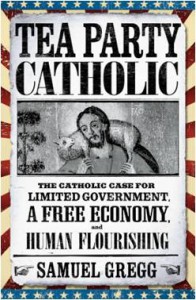Acton’s Director of Research, Samuel Gregg, discusses Founding Father Charles Carroll at Intercollegiate Review. “A Tea Party Thomist: Charles Carroll” is excerpted from Gregg’s upcoming book, Tea Party Catholic: The Catholic Case For Limited Government, A Free Economy And Human Flourishing. In the article, Gregg tells of Carroll’s reaction to the Peggy Stewart sailing into Annapolis’ harbor, sparking the controversy regarding the British right to tax the American Colonies.
Limited Government, A Free Economy And Human Flourishing. In the article, Gregg tells of Carroll’s reaction to the Peggy Stewart sailing into Annapolis’ harbor, sparking the controversy regarding the British right to tax the American Colonies.
The political point of this exercise was to elicit the American colonists’ implicit agreement to the British Parliament’s right to tax the American colonies. This at least was how it was understood by those American colonists who were increasingly incensed at what they regarded as a pattern of repression against His Majesty’s subjects in British North America.
Opposition to what many Americans viewed as the British government’s latest arbitrary act was especially fierce in Maryland. Few were more outspoken in their opposition than one of its leading public figures, Charles Carroll of Carrollton. “It will not do,” Carroll insisted, “to export the tea to Europe or the West Indies. Its importation is an offense for which the people will not be so easily satisfied.”
Carroll was no man of violence. He was disconcerted by some of the Boston Tea Party’s radical undertones. Carroll also worried about the potential for anarchy that is part of any revolution.
Many remember Carroll as being the only Catholic to sign the Declaration of Independence, but as Gregg shows, Carroll should be remembered for his tremendous support for economic freedom.
Carroll was also a strong believer in economic freedom—and not merely because he recognized all the economic problems associated with what Adam Smith called “the mercantile system” that dominated Europe from the 1500s until the end of the eighteenth century. Carroll’s commitment to economic liberty was also, in all likelihood, influenced by the moral teachings of his faith.
Charles Carroll always stood out among the American colonists in his opposition to import and export duties imposed by the British Parliament. Indeed Carroll thought the American colonies should never have agreed in the first place to Britain imposing any duties on American merchants. This position was not common among Carroll’s contemporaries in the 1760s.
As a close student of European politics, however, Carroll understood that Britain’s policies in this area owed much to the efforts of Britain’s prime minister, William Pitt, to curry favor with British merchants, many of whom exerted enormous influence upon British political life. British merchants, as Carroll well knew from his years spent living in France and England, feared competition from America. It threatened the comfortable niches that they maintained through closeness to those in power rather than hard work and competition in the marketplace.
Gregg goes on to illustrate how Carroll’s faith informed his thinking on economics and liberty.
Read “A Tea Party Thomist: Charles Carroll” at Intercollegiate Review.

